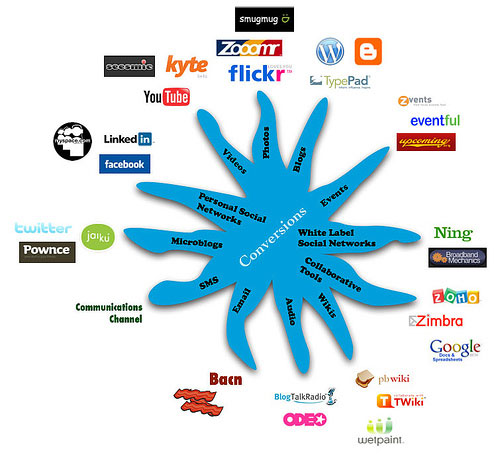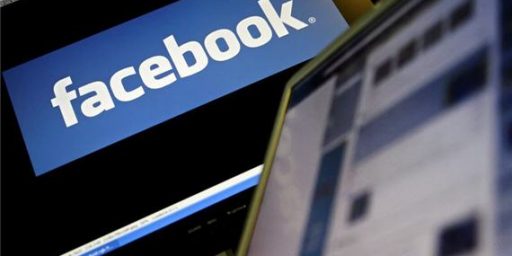Social Media Overload
Mark Glaser calls attention to one of the strange dilemmas of modern life: deciding whom to “friend” on various social media sites like Facebook and MySpace.

Is the person a friend, a real friend, or someone who wants to be a friend? Should I add them as a friend because it’s polite, or ignore them because I want to protect my personal information?
The one “network effect” that people don’t mention too often is the way that you get more and more friend requests with each social media site you join. Whether it’s MySpace, Facebook, LinkedIn, Flickr, Pownce, Twitter or any of the other various social media sites sprouting up like weeds, you are always faced with the dilemma on who to add to your “friend” list.
I’ve rarely given this question much thought, and now I’m paying for that with a lot of irrelevant Facebook email alerts as well as MySpace spam messages. So I put the question to MediaShift readers: How do you choose among friend requests?
The answers, not surprisingly, varied but most people seem to only “friend” people they actually know in some sense; many, only those they’ve met in person.
I’ve gone slightly beyond that to include people I “know” online, particularly other bloggers or people with whom I’ve worked and corresponded. Still, that gets to be a large number and I want more information on people I know well or whose blogs I read daily than I do with casual acquaintances and Facebook (the one of these I use most) doesn’t allow you to differentiate. When, several months ago, they started allowing outside applications to creep in and I started getting updates about friends engaging in vampire wars, announcing their movie selections, and various other trivia, I relegated emails from Facebook to a separate folder that bypasses the inbox and have now just occasionally check in.
I’m also on LinkedIn, a business network, that serves no discernible purpose. I’ve had an account for years and revived interest in keeping up with it a few months back after getting a flurry of invitations from people I knew. But I’ve got no idea what it’s supposed to do for me beyond “everybody” being on it.
Glaser’s colleague, Jennifer Woodard Maderazo, is simultaneously excited and worried about the Friendfeed phenomenon, which “takes feeds of your activity on 35 different social networks and puts them all in one place.” While convenient and synergistic, it also magnifies the glut of unwanted information and makes more clear how much of her private information she’s putting out there for people with whom she’s only vaguely associated to see.
One presumes that people will make sense of the social media world over time. Either people will be more discriminating in who they “friend” or put less information on these sites or the technology will evolve to allow one to give more weight to “best friends” and less to casual acquaintances.
Image: Jon Ray




I am curious why online personalities like Glaser fret over the issue at all. I have both a blog and a YouTube channel. I have let it be known if one is a fan of either, then he should feel free to add me to either MySpace, Facebook, or both.
I add anyone who I can determine is not a fake spamming profile. I am under no illusion, and neither are they, that that we have any sort of real friendship. It is just people showing appreciation for what I do.
Granted, I do not get 300 requests a day and have 10,000 “friends” already like some high profile bloggers would have, so perhaps it is more troublesome for some, but I would not give the issue much weight. Social networking online is about as frivolous as it gets.
I suspect that social networking sites are about to start entering their consolidation phase. Basically, what happened with search engines about ten years ago.
The closest I’ve ever come to social networking is that I started up a Facebook profile, decided it was too much hassle, and that’s it. I have no myspace page. I just fail to see the point. Why wait for a “friend” request when someone can just email me and ask me what I’m up to?
People sure worry about strange things. Online social networking problems? Too many online “friends”? Get out of the basement and into the sunshine.
Well, I have heard of this thing called “sunshine”. But it seems that light of such intensity (produced by nuclear fusion no less), would make my laptop screen hard to read. So why bother?
On a more serious note, I think that norms will spring up about who you can contact and why. I am beginning to think that anyone who sends me unsolicited mail must a) take responsibility for any identity theft b) pay the PO to have it returned to them and c) pay special tip charges. The same goes for unwanted emails.
Indeed cleaning up ‘trash’ on the internet is a problem. I imagine we will figure that out too.
“I’m also on LinkedIn, a business network, that serves no discernible purpose.” – Really? I guess you’ve never had to hire someone before. LinkedIn has been a valuable recruiting tool for me and others I know. However, the success of LinkedIn is only as good as the quality of the network you have.
James, the very fact that people, apparent strangers to you, are commenting on your blog and moreover that you are writing commentary for the world to see, is contrary to your discriminating belief that people can’t interact with each others, strangers at that, on social media sites.
I’m not making any such claim. Merely that getting hundreds of tweets about what people are doing for entertainment and notices about who’s biting whom in various zombie and vampire wars becomes quickly overwhelming with too many “friends.”